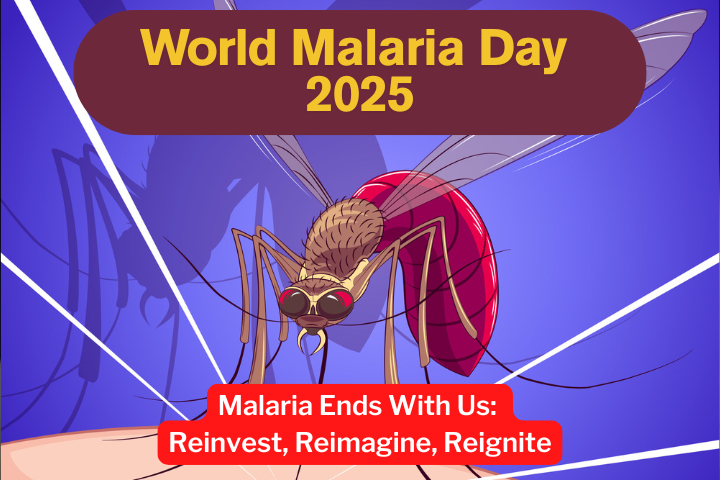On April 25, 2025, the world comes together to observe World Malaria Day under the theme “Malaria Ends With Us: Reinvest, Reimagine, Reignite”. This year’s focus underscores the urgent need to revitalize global efforts against malaria, a disease that continues to claim a life every minute, predominantly affecting children under five and pregnant women. Factors such as climate change, armed conflicts, and disruptions in healthcare services have worsened the situation, leaving millions of people without access to essential prevention and treatment. This article contains all the information about World Malaria Day 2025.
World Malaria Day 2025 “Malaria Ends With Us”
The World Malaria Day 2025 Theme is “Malaria Ends With Us: Reinvest, Reimagine, Reignite.” This theme highlights the urgent need to renew global commitment, foster innovation, and strengthen partnerships in the fight against malaria.
Reinvest
In the last 20 years, global efforts have helped prevent around 2.2 billion malaria cases and saved 12.7 million lives. But malaria is still a serious threat. In 2023, there were about 263 million new cases and nearly 600,000 deaths around the world. Most of these were in Africa, which faced 94% of all cases and 95% of the deaths. To keep making progress, we need to reinvest in proven tools like bed nets, indoor spraying, and effective medicines. Right now, there’s a funding gap of 4.3 billion $ a year. Bridging this gap is key to making sure these life-saving tools reach the people who need them most.
Reimagine
Innovation is helping us find better ways to stop malaria. Two new malaria vaccines; RTS,S and R21 are giving hope, especially for young children, who are most at risk. In 2023, Nigeria, the country with the highest number of malaria cases, started giving the R21 vaccine to children. Advancements in technology and data analysis are helping health programs to better target and support affected populations. These tools allow for more effective planning and delivery of malaria interventions.
Reignite
To end malaria, governments, health groups, communities, and individuals need to work together. Local communities play a key role. When people are informed and have the right tools, they can protect themselves and their families. Programs like the WHO’s E-2025, which aims to eliminate malaria in 25 more countries by 2025, show what we can achieve when we unite our efforts. Together, by reigniting our passion and actions, we can end this deadly but preventable disease.
World Malaria Day 2025 History
On August 20, 1897, British physician Sir Ronald Ross made a landmark discovery by identifying the malaria parasite in the stomach of a female Anopheles mosquito. This provided the first scientific evidence that mosquitoes transmit malaria to humans. In honor of this pivotal breakthrough, World Malaria Day was officially established in May 2007 by the 60th session of the World Health Assembly, which is the main decision-making body of the World Health Organization (WHO). The first World Malaria Day was observed in 2008.
Before becoming a global event, Africa Malaria Day was observed from 2001 by African countries as a way to review progress in tackling malaria and reducing deaths caused by it. In 2007, it was proposed to rename Africa Malaria Day to World Malaria Day.
About Malaria
Malaria is a serious and sometimes fatal disease caused by parasites of the Plasmodium genus. These parasites are transmitted to humans through the bite of infected female Anopheles mosquitoes. Malaria is primarily found in tropical and subtropical regions, including parts of Africa, Asia, and South America.
Causes
Malaria is caused by five species of the Plasmodium parasite: Plasmodium falciparum, Plasmodium vivax, Plasmodium malariae, Plasmodium ovale, and Plasmodium knowlesi. P. falciparum and P. vivax are the most common and dangerous.
Transmission
The disease is transmitted when an infected mosquito bites a human, injecting the parasites into the bloodstream.
Symptoms
Common Symptoms of Malaria include fever, shivering, discomfort, headache, nausea and vomiting, diarrhea, stomach pain, muscle or joint pain, fatigue, rapid breathing, rapid heart rate and cough.
Preventions
Here’s how to prevent Malaria:
- Sleep under insecticide-treated bed nets to avoid mosquito bites.
- Use mosquito repellents on skin and clothing, especially during evening and night.
- Cover arms and legs with full-sleeved clothes to minimize exposure.
- Prevent mosquito breeding by removing stagnant water around homes.
- Use indoor residual spraying with insecticides to kill mosquitoes.
- In high-risk areas, use prescribed antimalarial drugs (especially for pregnant women and children).
- In malaria-prone regions people can receive Malaria vaccinations.
World Malaria Day 2025 Significance
World Malaria Day plays a crucial role in raising global awareness about malaria and advancing efforts to combat the disease. The World Malaria Day significance is mentioned here:
- Raising Awareness: World Malaria Day bring attention to the challenges and ongoing progress in the fight against malaria, highlighting the need for its prevention, treatment, and control.
- Mobilizing Support: World Malaria Day encourages governments, international organizations, and the private sector to contribute to malaria control initiatives, including funding research and ensuring the distribution of preventive measures such as insecticide-treated nets and indoor spraying.
- Advocating for Policy Change: World Malaria Day is an opportunity to advocate for policies that strengthen health systems and ensure equitable access to malaria prevention and treatment services, particularly in high-risk regions.
- Promoting Community Engagement: World Malaria Day emphasizes the importance of local communities in malaria prevention, encouraging active participation in health initiatives and raising awareness about the significance of timely treatment.
- Addressing Health Inequities: The day highlights the impact of malaria on vulnerable populations, such as young children and pregnant women, and calls for targeted interventions to reduce health disparities.
| Related Posts | |
| Important Days in April 2025 | |
| Important Days and Dates in 2025 | |
| Good Friday 2025 | |
| World Hemophilia Day 2025 |




 Bank Holidays in May 2025, Will Bank be ...
Bank Holidays in May 2025, Will Bank be ...
 International Labour Day 2025, Theme, Hi...
International Labour Day 2025, Theme, Hi...
 Ayushman Bharat Diwas 2025, Date, Theme ...
Ayushman Bharat Diwas 2025, Date, Theme ...








